- Home
- David Brin
The Postman
The Postman Read online
PRAISE FOR THE NOVELS OF DAVID BRIN
GLORY SEASON
“Brin is a bold and imaginative writer, and Glory Season will be one of the most important SF novels of the year.”
—The Washington Post Book World
EARTH
“A major effort.… The Moby-Dick of the whole earth movement”
—Locus
STARTIDE RISING
“One hell of a novel.… Startide Rising has what SF readers want these days; intelligence, action and an epic scale.”
—Baird Searles, Isaaac Asimov’s Science Fiction Magazine
SUNDIVER
“Brin has a fertile and well-developed imagination … coupled with a sinuous and rapid-paced style.”
—Heavy Metal
HEART OF THE COMET
(with Gregory Benford)
“A glittering new work of hard science fiction.”
—Los Angeles Times
THE PRACTICE EFFECT
“Lively, outlandish and entertaining.”
—Publishers Weekly
THE RIVER OF TIME
“Brin is a scientist who knows how to tell a story. That’s a rare combination.”
—Jerry Pournelle
BOOKS BY DAVID BRIN:
EARTH
GLORY SEASON
THE HEART OF THE COMET
(with Gregory Benford)
OTHERNESS
THE POSTMAN
THE PRACTICE EFFECT
THE UPLIFT BOOKS
SUNDIVER
STARTIDE RISING
THE UPLIFT WAR
BRIGHTNESS REEF
INFINITY’S SHORE
HEAVEN’S REACH
And available
from Bantam Books
CONTACTING ALIENS
An Illustrated Guide to
David Brin’s Uplift Universe
(with Kevin Lenagh)
This edition contains the complete text of the original hardcover edition.
NOT ONE WORD HAS BEEN OMITTED.
THE POSTMAN
A Bantam Spectra Book
PUBLISHING HISTORY
Bantam hardcover edition / November 1985
Bantam paperback edition / November 1986
Bantam reissue edition / December 1997
Parts of this book appeared earlier in slightly different form: Part I as “The Postman” in the November 1982 issue of Isaac Asimov’s SF Magazine, and Part II as “Cyclops” in the March 1984 issue of Isaac Asimov’s SF Magazine.
Spectra and the portrayal of a boxed “s” are trademarks of Bantam Books, a division of Random House, Inc.
All rights reserved.
Copyright © 1985 by David Brin.
Library of Congress Catalog Card Number: 85-47647.
No part of this book may be reproduced or transmitted in any form or by any means, electronic or mechanical, including photocopying, recording, or by any information storage and retrieval system, without permission in writing from the publisher. For information address: Bantam Books.
eISBN: 978-0-307-57501-2
Bantam Books are published by Bantam Books, a division of Random House, Inc. Its trademark, consisting of the words “Bantam Books” and the portrayal of a rooster, is Registered in U.S. Patent and Trademark Office and in other countries. Marca Registrada. Bantam Books, New York, New York.
v3.1_r1
To Benjamin Franklin,
devious genius,
and to Lysistrata,
who tried
Contents
Cover
Other Books by This Author
Title Page
Copyright
Dedication
Prelude - The Thirteen-Year Thaw
Part I - The Cascades Chapter 1
Chapter 2
Chapter 3
Chapter 4
Chapter 5
Chapter 6
Chapter 7
Chapter 8
Part II - Cyclops Chapter 1 - Curtin
Chapter 2 - Cottage Grove
Chapter 3 - Eugene
Chapter 4 - Harrisburg
Chapter 5 - Corvallis
Chapter 6 - Dena
Chapter 7 - Cyclops
Chapter 8
Chapter 9 - Buena Vista
Chapter 10 - Sciotown
Chapter 11 - Corvallis
Chapter 12 - Oregon
Part III - Cincinnatus Chapter 1
Chapter 2
Chapter 3
Chapter 4
Chapter 5
Chapter 6
Chapter 7
Chapter 8
Chapter 9
Chapter 10
Chapter 11
Chapter 12
Chapter 13
Chapter 14
Chapter 15
Chapter 16
Chapter 17
Chapter 18
Part IV - Neither Chaos Chapter 1
Chapter 2
Acknowledgements
About the Author
PRELUDE
THE THIRTEEN-
YEAR THAW
Chill winds still blew. Dusty snow fell. But the ancient sea was in no hurry.
The Earth had spun six thousand times since flames blossomed and cities died. Now, after sixteen circuits of the Sun, plumes of soot no longer roiled from burning forests, turning day into night.
Six thousand sunsets had come and gone—gaudy, orange, glorious with suspended dust—ever since towering, superheated funnels had punched through to the stratosphere, filling it with tiny bits of suspended rock and soil. The darkened atmosphere passed less sunlight—and it cooled.
It hardly mattered anymore what had done it—a giant meteorite, a huge volcano, or a nuclear war. Temperatures and pressures swung out of balance, and great winds blew.
All over the north, a dingy snow fell, and in places even summer did not erase it.
Only the Ocean, timeless and obstinate, resistant to change, really mattered. Dark skies had come and gone. The winds pushed ocher, growling sunsets. In places, the ice grew, and the shallower seas began to sink.
But the Ocean’s vote was all important, and it was not in yet.
The Earth turned. Men still struggled, here and there.
And the Ocean breathed a sigh of winter.
I
THE CASCADES
1
In dust and blood—with the sharp tang of terror stark in his nostrils—a man’s mind will sometimes pull forth odd relevancies. After half a lifetime in the wilderness, most of it spent struggling to survive, it still struck Gordon as odd—how obscure memories would pop into his mind right in the middle of a life-or-death fight.
Panting under a bone-dry thicket—crawling desperately to find a refuge—he suddenly experienced a recollection as clear as the dusty stones under his nose. It was a memory of contrast—of a rainy afternoon in a warm, safe university library, long ago—of a lost world filled with books and music and carefree philosophical ramblings.
Words on a page.
Dragging his body through the tough, unyielding bracken, he could almost see the letters, black against white. And although he couldn’t recall the obscure author’s name, the words came back with utter clarity.
“Short of Death itself, there is no such thing as a ‘total’ defeat.… There is never a disaster so devastating that a determined person cannot pull something out of the ashes—by risking all that he or she has left.…
“Nothing in the world is more dangerous than a desperate man.”
Gordon wished the long-dead writer were here right now, sharing his predicament. He wondered what pollyannish glow the fellow might find around this catastrophe.
Scratched and torn from his desperate escape into this dense thicket, he crawled as quietly
as he could, stopping to lay still and squeeze his eyes shut whenever the floating dust seemed about to make him sneeze. It was slow, painful progress, and he wasn’t even sure where he was headed.
Minutes ago he had been as comfortable and well-stocked as any solitary traveler could hope to be, these days. Now, Gordon was reduced to not much more than a ripped shirt, faded jeans, and camp moccasins—and the thorns were cutting them all to bits.
A tapestry of fiery pain followed each new scratch down his arms and back. But in this awful, bone-dry jungle, there was nothing to do but crawl onward and pray his twisting path did not deliver him back to his enemies—to those who had effectively killed him already.
Finally, when he had come to think the hellish growth would never end, an opening appeared ahead. A narrow cleft split the brush and overlooked a slope of tumbled rock. Gordon pulled free of the thorns at last, rolled over onto his back, and stared up at the hazy sky, grateful simply for air that wasn’t foul with the heat of dry decay.
Welcome to Oregon, he thought bitterly. And I thought Idaho was bad.
He lifted one arm and tried to wipe the dust out of his eyes.
Or is it that I’m simply getting too old for this sort of thing? After all, he was over thirty now, beyond the typical life expectancy of a postholocaust traveler.
Oh Lord, I wish I was home again.
He wasn’t thinking of Minneapolis. The prairie today was a hell he had struggled for more than a decade to escape. No, home meant more to Gordon than any particular place.
A hamburger, a hot bath, music, Merthiolate …
… a cool beer …
As his labored breathing settled, other sounds came to the fore—the all too clear noise of happy looting. It rose from a hundred feet or so down the mountainside. Laughter as the delighted robbers tore through Gordon’s gear.
… a few friendly neighborhood cops … Gordon added, still cataloging the amenities of a world long gone.
The bandits had caught him off guard as he sipped elderberry tea by a late afternoon campfire. From that first instant, as they charged up the trail straight at him, it had been clear that the hot-faced men would as soon kill Gordon as look at him.
He hadn’t waited for them to decide which to do. Throwing scalding tea into the face of the first bearded robber, he dove right into the nearby brambles. Two gunshots had followed him, and that was all. Probably, his carcass wasn’t worth as much to the thieves as an irreplaceable bullet. They already had all his goods, anyway.
Or so they probably think.
Gordon’s smile was bitterly thin as he sat up carefully, backing along his rocky perch until he felt sure he was out of view of the slope below. He plucked his travel belt free of twigs and drew the half-full canteen for a long, desperately needed drink.
Bless you, paranoia, he thought. Not once since the Doomwar had he ever allowed the belt more than three feet from his side. It was the only thing he had been able to grab before diving into the brambles.
The dark gray metal of his .38 revolver shone even under a fine layer of dust, as he drew it from its holster. Gordon blew on the snub-nosed weapon and carefully checked its action. Soft clicking testified in understated eloquence to the craftsmanship and deadly precision of another age. Even in killing, the old world had made well.
Especially in the art of killing, Gordon reminded himself. Raucous laughter carried up from the slope below.
Normally he traveled with only four rounds loaded. Now he pulled two more precious cartridges from a belt pouch and filled the empty chambers under and behind the hammer. “Firearm safety” was no longer a major consideration, especially since he expected to die this evening anyway.
Sixteen years chasing a dream, Gordon thought. First that long, futile struggle against the collapse … then scratching to survive through the Three-Year Winter … and finally, more than a decade of moving from place to place, dodging pestilence and hunger, fighting goddamned Holnists and packs of wild dogs … half a lifetime spent as a wandering, dark age minstrel, play-acting for meals in order to make it one day more while I searched for …
… for someplace …
Gordon shook his head. He knew his own dreams quite well. They were a fool’s fantasies, and had no place in the present world.
… for someplace where someone was taking responsibility …
He pushed the thought aside. Whatever he had been looking for, his long seeking seemed to have ended here, in the dry, cold mountains of what had once been eastern Oregon.
From the sounds below he could tell that the bandits were packing up, getting ready to move off with their plunder. Thick patches of desiccated creeper blocked Gordon’s view downslope through the ponderosa pines, but soon a burly man in a faded plaid hunting coat appeared from the direction of his campsite, moving northeast on a trail leading down the mountainside.
The man’s clothing confirmed what Gordon remembered from those blurred seconds of the attack. At least his assailants weren’t wearing army surplus camouflage … the trademark of Holn survivalists.
They must be just regular, run of the mill, may-they-please-roast-in-Hell bandits.
If so, then there was a sliver of a chance the plan glimmering in his mind just might accomplish something.
Perhaps.
The first bandit had Gordon’s all-weather jacket tied around his waist. In his right arm he cradled the pump shotgun Gordon had carried all the way from Montana. “Come on!” the bearded robber yelled back up the trail. “That’s enough gloating. Get that stuff together and move it!”
The leader, Gordon decided.
Another man, smaller and more shabby, hurried into view carrying a cloth sack and a battered rifle. “Boy, what a haul! We oughta celebrate. When we bring this stuff back, can we have all the ’shine we want, Jas?” The small robber hopped like an excited bird. “Boy, Sheba an’ the girls’ll bust when they hear about that lil’ rabbit we drove off into the briar patch. I never seen anything run so fast!” He giggled.
Gordon frowned at the insult added to injury. It was the same nearly everywhere he had been—a postholocaust callousness to which he’d never grown accustomed, even after all this time. With only one eye peering through the scrub grass rimming his cleft, he took a deep breath and shouted.
“I wouldn’t count on getting drunk yet, Brer Bear!” Adrenaline turned his voice more shrill than he wanted, but that couldn’t be helped.
The big man dropped awkwardly to the ground, scrambling for cover behind a nearby tree. The skinny robber, though, gawked up at the hillside.
“What …? Who’s up there?”
Gordon felt a small wash of relief. Their behavior confirmed that the sons of bitches weren’t true survivalists. Certainly not Holnists. If they had been, he’d probably be dead by now.
The other bandits—Gordon counted a total of five—hurried down the trail carrying their booty. “Get down!” their leader commanded from his hiding place. Scrawny seemed to wake up to his exposed position and hurried to join his comrades behind the undergrowth.
All except one robber—a sallow-faced man with salt-and-pepper sideburns, wearing an alpine hat. Instead of hiding he moved forward a little, chewing a pine needle and casually eyeing the thicket.
“Why bother?” he asked calmly. “That poor fellow had on barely more than his skivvies, when we pounced him. We’ve got his shotgun. Let’s find out what he wants.”
Gordon kept his head down. But he couldn’t help noticing the man’s lazy, affected drawl. He was the only one who was clean shaven, and even from here Gordon could tell that his clothes were cleaner, more meticulously tended.
At a muttered growl from his leader, the casual bandit shrugged and sauntered over behind a forked pine. Barely hidden, he called up the hillside. “Are you there, Mister Rabbit? If so, I am so sorry you didn’t stay to invite us to tea. Still, aware how Jas and Little Wally tend to treat visitors, I suppose I cannot blame you for cutting out.”
Gordon co
uldn’t believe he was trading banter with this twit. “That’s what I figured at the time,” he called. “Thanks for understanding my lack of hospitality. By the way, with whom am I speaking?”
The tall fellow smiled broadly. “With whom …? Ah, a grammarian! What joy. It’s been so long since I’ve heard an educated voice.” He doffed the alpine hat and bowed. “I am Roger Everett Septien, at one time a member of the Pacific Stock Exchange, and presently your robber. As for my colleagues …”
The bushes rustled. Septien listened, and finally shrugged. “Alas,” he called to Gordon. “Normally I’d be tempted by a chance for some real conversation; I’m sure you’re as starved for it as I. Unfortunately, the leader of our small brotherhood of cutthroats insists that I find out what you want and get this over with.
“So speak your piece, Mister Rabbit. We are all ears.”
Gordon shook his head. The fellow obviously classed himself a wit, but his humor was fourth-rate, even by postwar standards. “I notice you fellows aren’t carrying all of my gear. You wouldn’t by some chance have decided to take only what you needed, and left enough for me to survive, would you?”
From the scrub below came a high giggle, then more hoarse chuckles as others joined in. Roger Septien looked left and right and lifted his hands. His exaggerated sigh seemed to say that he, at least, appreciated the irony in Gordon’s question.
“Alas,” he repeated. “I recall mentioning that possibility to my compatriots. For instance, our women might find some use for your aluminum tent poles and pack frame, but I suggested we leave the nylon bag and tent, which are useless to us.
“Um, in a sense we have done this. However, I don’t think that Wally’s … er, alterations will meet your approval.”
Again, that shrieking giggle rose from the bushes. Gordon sagged a little.
“What about my boots? You all seem well enough shod. Do they fit any of you, anyway? Could you leave them? And my jacket and gloves?”
Septien coughed. “Ah, yes. They’re the main items, aren’t they? Other than the shotgun, of course, which is nonnegotiable.”
Gordon spat. Of course, idiot. Only a blowhard states the obvious.

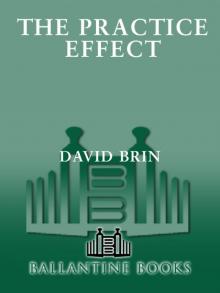 The Practice Effect
The Practice Effect Infinity's Shore
Infinity's Shore Insistence of Vision
Insistence of Vision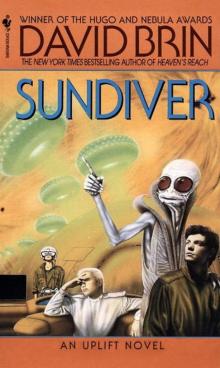 Sundiver
Sundiver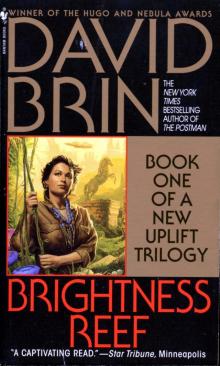 Brightness Reef
Brightness Reef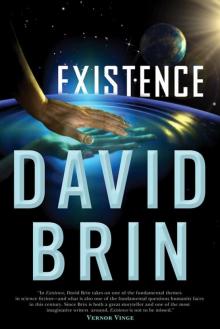 Existence
Existence The Transparent Society
The Transparent Society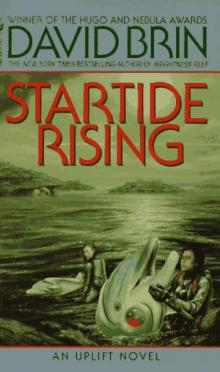 Startide Rising
Startide Rising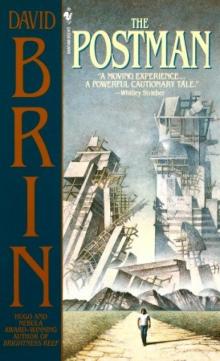 The Postman
The Postman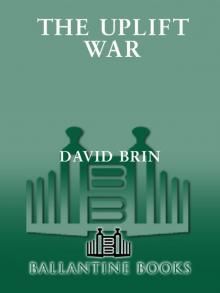 The Uplift War
The Uplift War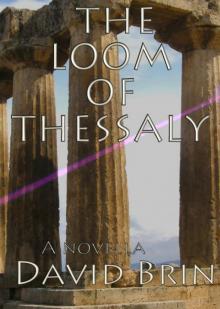 The Loom of Thessaly
The Loom of Thessaly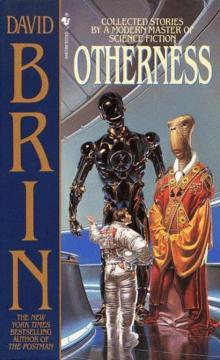 Otherness
Otherness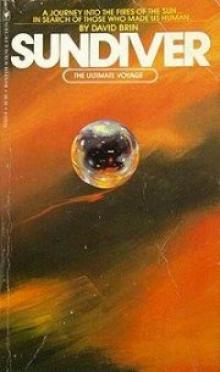 Sundiver u-1
Sundiver u-1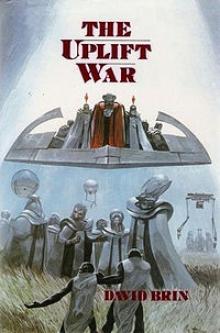 The Uplift War u-3
The Uplift War u-3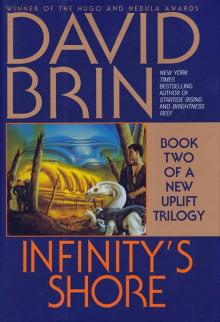 Infinity's Shore u-5
Infinity's Shore u-5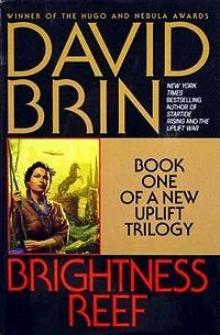 Brightness Reef u-4
Brightness Reef u-4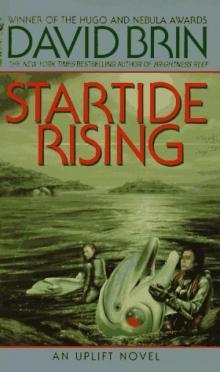 Uplift 2 - Startide Rising
Uplift 2 - Startide Rising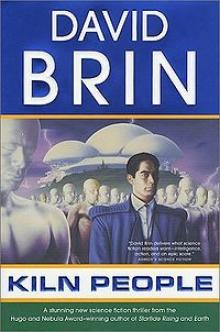 Kiln People
Kiln People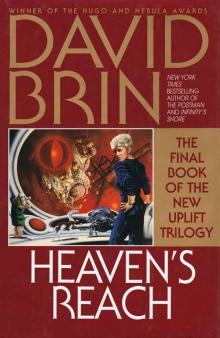 Heaven's Reach u-6
Heaven's Reach u-6 The Transparent Society: Will Technology Force Us to Choose Between Privacy and Freedom?
The Transparent Society: Will Technology Force Us to Choose Between Privacy and Freedom?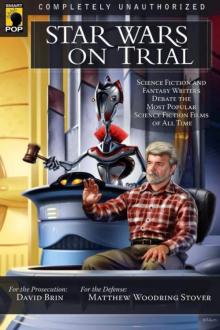 Star Wars on Trial
Star Wars on Trial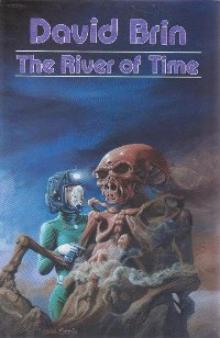 Lungfish
Lungfish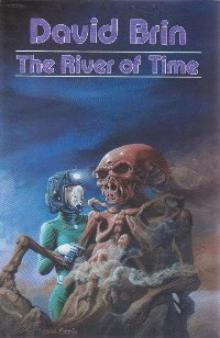 Tank Farm Dynamo
Tank Farm Dynamo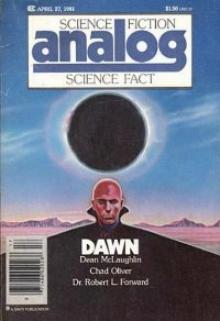 Just a Hint
Just a Hint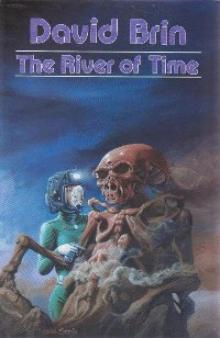 A Stage of Memory
A Stage of Memory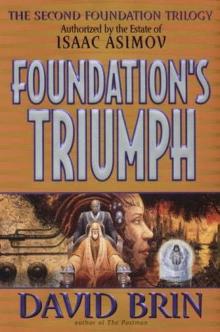 Foundation’s Triumph sf-3
Foundation’s Triumph sf-3 Thor Meets Captain America
Thor Meets Captain America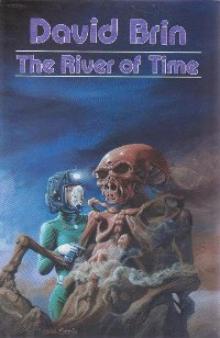 Senses Three and Six
Senses Three and Six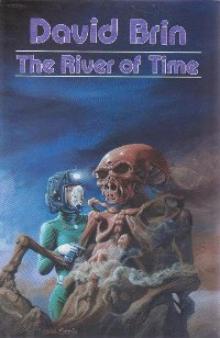 The River of Time
The River of Time Chasing Shadows: Visions of Our Coming Transparent World
Chasing Shadows: Visions of Our Coming Transparent World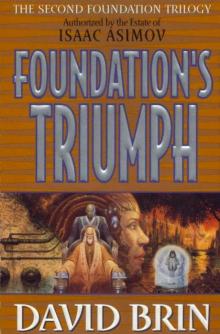 Foundation's Triumph
Foundation's Triumph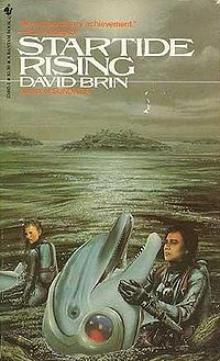 Startide Rising u-2
Startide Rising u-2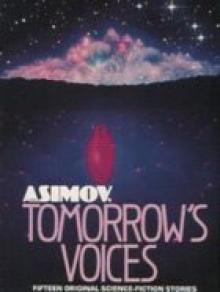 The Fourth Vocation of George Gustaf
The Fourth Vocation of George Gustaf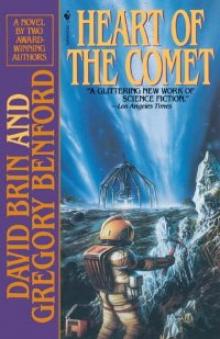 The Heart of the Comet
The Heart of the Comet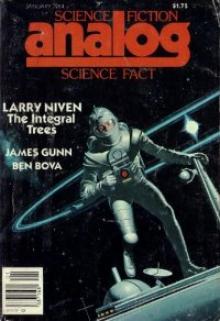 The Crystal Spheres
The Crystal Spheres